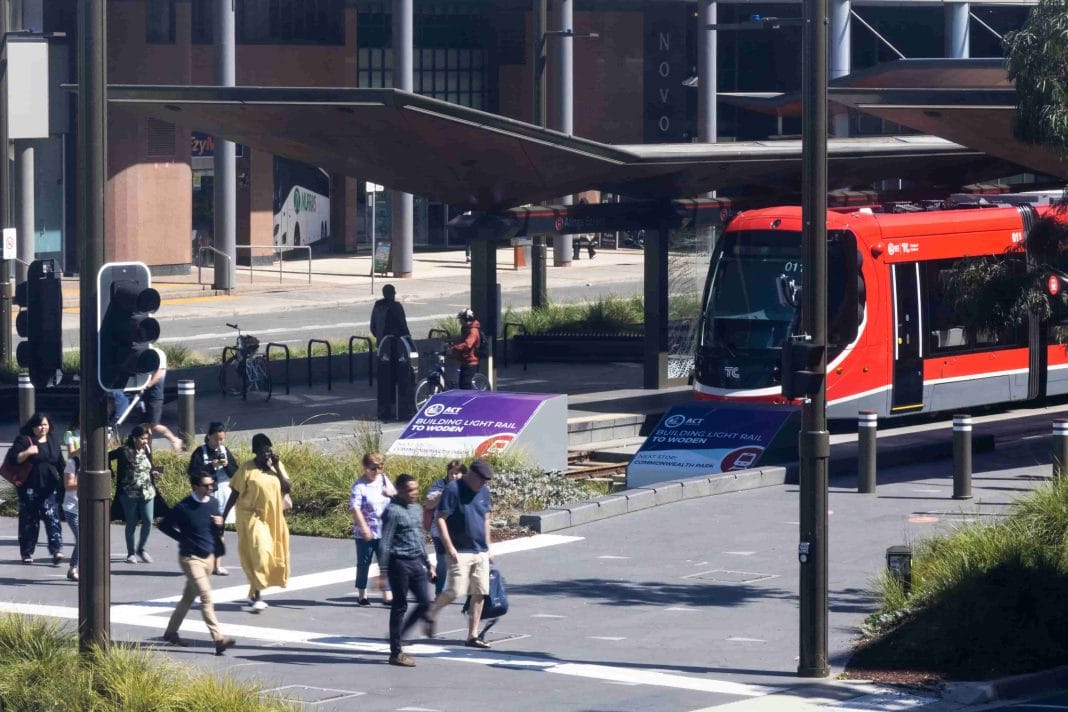Shadow transport minister Mark Parton yesterday called on the ACT Government to provide a revised business case and economic analysis for stage 2A of light rail, as the ACT Auditor-General requested last year.
“The government rejected the Auditor-General’s recommendations to redo the business case and then reveal it publicly,” Mr Parton said. “That’s why I’m calling upon them in the Chamber to do so.”
The ACT Government will prepare and publish a Benefits Realisation Plan during the project’s delivery phase, but will not provide the updated business case, Chris Steel, ACT Minister for Transport and City Services, said.
However, it would prepare the business case for stage 2B and any future stages of light rail with the Auditor-General’s advice and views in mind. Those future business cases will be publicly released “at an appropriate time”, so the Canberra community and Auditor-General can review them.
In September, the Auditor-General produced what Mr Parton termed a “scathing” report, stating that capital costs were higher than the government estimated, many benefits claimed depended on other projects, and the government had not developed a standard practice Benefits Realisation Plan.
“The Auditor-General tore the economic analysis to shreds,” Mr Parton said. “All of the estimates of costs were downplayed, and all of the estimates of benefits were up-played.”
The Auditor-General called on the government then to review and update the economic analysis for stage 2A, explicitly identifying development costs and benefits associated with the project, and to develop the Benefits Realisation Plan.
Testifying at the Public Accounts Committee hearing in May, the Auditor-General observed that the business case and economic analysis omitted significant costs, overstated benefits, lacked an assurance process, paid no attention to the economic analysis, was not professional, withheld data that should have been made available, and lacked transparency, Mr Parton noted.
He claimed the government had not been transparent because they knew their business case for stage 2A “did not stack up”.
“This motion is not about the inevitability of light rail; it’s about people getting value for money, and it’s about the government being clean on exactly the information that they’ve got. I don’t understand why the government has to be dragged kicking and screaming to provide any meaningful public information when it comes to this project.”
Mr Steel said the ACT Government had been “extremely transparent” in releasing the Stage 2A business case and economic analysis.
They had made a redacted business case publicly available in 2019, omitting commercially sensitive pricing details. The Chief Minister made those figures publicly available for the purposes of the audit last year.
The business case, prepared by reputable firm EY (Ernst & Young), Mr Steel maintained, was a “point-in-time assessment tool … to decide if a project should go ahead”.
And the project would go ahead, the Minister promised. Work had begun last year, and main works construction would begin once London Circuit was raised in a couple of months.
The Liberals, Mr Steel claimed, wanted to undermine light rail, Canberra’s biggest infrastructure project. They wanted to “go right back to the start of the process and reconsider whether stage 2A of light rail to Woden should ever get built. By calling for a new business case, he [Mr Parton] is saying that the Canberra Liberals haven’t decided if they’re over the line yet on the project.”
Mr Steel said the government would absolutely not “let the Canberra Liberals slow down or obstruct delivery of this important transformational project for Canberra’s future, just because they don’t like it and never have”.
In Mr Parton’s view, he had told the press earlier in the day, light rail should go ahead, at this stage.
“His [Mr Steel’s] attacks on me painting me as some sort of anti-tram warrior reek of desperation and reek of a Minister who is out of his depth,” he retorted.
Mr Parton had told media earlier he expected his motion to be “amended into oblivion” because the government did not want scrutiny. The Auditor-General had raised concerns about governance and analysis over the sale of Block 30 in Dickson (2018), the purchase of properties to the west of Canberra, residential land supply (2020), and the Campbell Primary School Modernisation last year.
“We can clearly see a stark body of evidence demonstrating this government’s preparedness to take shortcuts, to withhold critical data, and to create spurious arguments to suit their ideological goals,” Mr Parton said.
“This government clearly disregards open, transparent, and objective evidence in favour of doing things irrespective of the cost. Surely, you cannot keep draining the community’s purse this way. And further still, you cannot continue to ignore our very own Auditor-General!”



